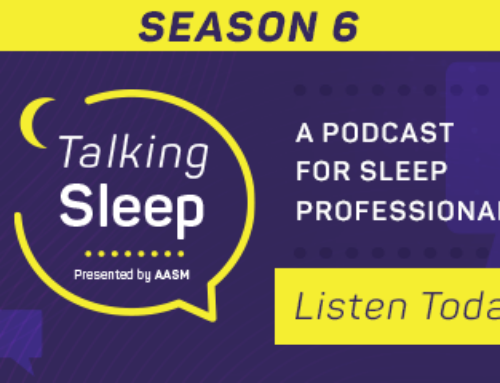Talking Sleep Season 4
Episode 15
Untreated OSA and Alzheimer’s Disease
Dr. Andrew Varga, GUEST
 Welcome to the 50th episode of Talking Sleep! In this episode, Dr. Andrew Varga highlights recent research into the acute effect of obstructive sleep apnea on Alzheimer’s disease biomarkers. Dr. Varga discusses research from Mount Sinai that found significant changes in neurofilament light and beta amyloid (Aβ40) in patients with OSA who discontinued CPAP therapy for one night. The study adds to growing literature suggesting that untreated OSA is poor for brain health and may increase risk for neurodegenerative disease.
Welcome to the 50th episode of Talking Sleep! In this episode, Dr. Andrew Varga highlights recent research into the acute effect of obstructive sleep apnea on Alzheimer’s disease biomarkers. Dr. Varga discusses research from Mount Sinai that found significant changes in neurofilament light and beta amyloid (Aβ40) in patients with OSA who discontinued CPAP therapy for one night. The study adds to growing literature suggesting that untreated OSA is poor for brain health and may increase risk for neurodegenerative disease.
Andrew Varga, MD, is an assistant professor in the division of pulmonary, critical care and sleep medicine at the Icahn School of Medicine at Mount Sinai. He earned a PhD in neuroscience at Baylor College of Medicine and subsequently attended medical school at New York Medical College. He completed an internship in medicine at St. Vincent’s Catholic Medical Center and a residency in neurology at Harvard – Beth Israel Deaconess Medical Center. He then completed a fellowship in sleep medicine at NY. Dr. Varga’s research interests include mechanisms of learning and memory and the role of sleep in memory consolidation. His clinical interests involve all areas of sleep medicine with particular interest in movement disorders in sleep, sleep in neurodegenerative diseases, and generalized cognitive deficits as a function of fragmented sleep.
Episode Resources
- Acute OSA Impacts Diurnal Alzheimer’s Biomarkers Through Nocturnal Hypoxemia and State Transitions
- Continuous Positive Airway Pressure Restores Declarative Memory Deficit in Obstructive Sleep Apnea
- The Importance of Sleep-Dependent Memory Testing in Positive Airway Pressure Treatment of Obstructive Sleep Apnea
- Apnea-Induced Rapid Eye Movement Sleep Disruption Impairs Human Spatial Navigational Memory

